The Global Mental Health Gap: How AI Could Bridge the Divide
Blog, News The Global Mental Health Gap: How AI Could Bridge the...
Install Pleaze
The go-to place for help

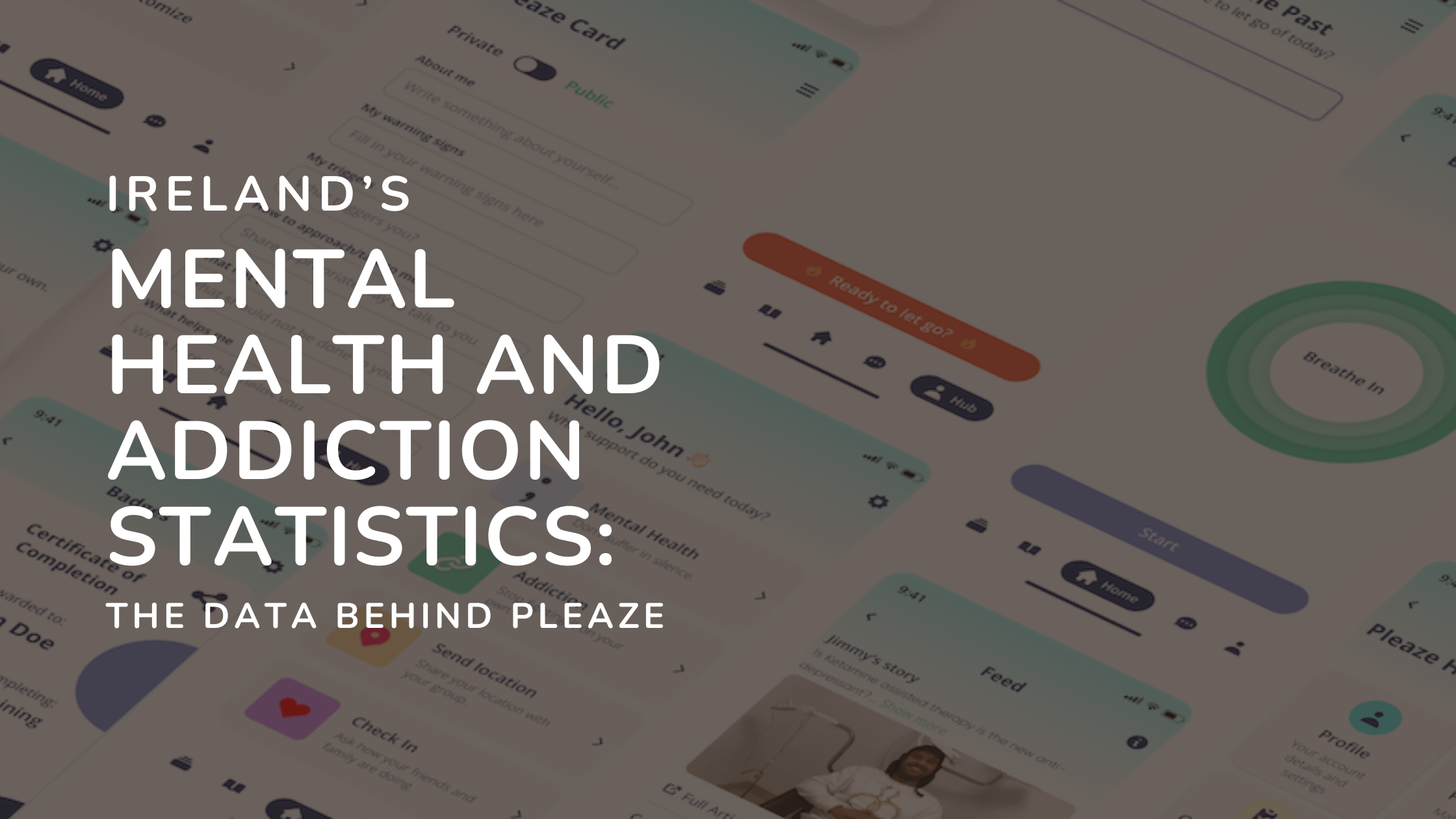
I’ve been digging into the numbers, the research, the whole landscape around mental health and addiction apps and what’s happening in Ireland specifically.
The good news – The timing for Pleaze couldn’t be better. The bad news – the figures are frightening.
Let me walk you through what I’ve found, because the story these numbers tell is pretty compelling.

First off, let’s talk about the elephant in the room – this isn’t some niche market we’re entering. The global digital mental health app market is sitting somewhere between $6.5 and $7.5 billion right now. By 2030? We’re looking at potentially $33 billion. That’s not a typo.
The growth rate? Between 14-18% annually. For context, that’s the kind of growth that makes investors lose sleep in a good way.
But here’s what really caught my attention – Europe accounts for about 26% of this market, worth nearly $2 billion in 2024. And it’s projected to more than double to $4.7 billion by 2030. So we’re not talking about jumping into some tiny pond here.
The biggest segment? Depression and anxiety management, which takes up about 28% of the market share.
Here’s something else – smartphone penetration is huge. We’re talking 5.4 billion people globally with mobile subscriptions in 2022, projected to hit 6.3 billion by 2030. Android alone has 3.9 billion users, iOS has over 1 billion. The infrastructure for apps like this is already there.
The market is hot right now: Mental health tech funding jumped 52% from 2019 to 2020 alone. The market is hot.
Now, I know what you’re thinking – “Great, another crowded market.” But hold on, because that’s where it gets interesting.
While the global market is booming, Ireland presents this perfect storm of need, policy support, and opportunity.
Let me hit you with some statistics that stopped me in my tracks:
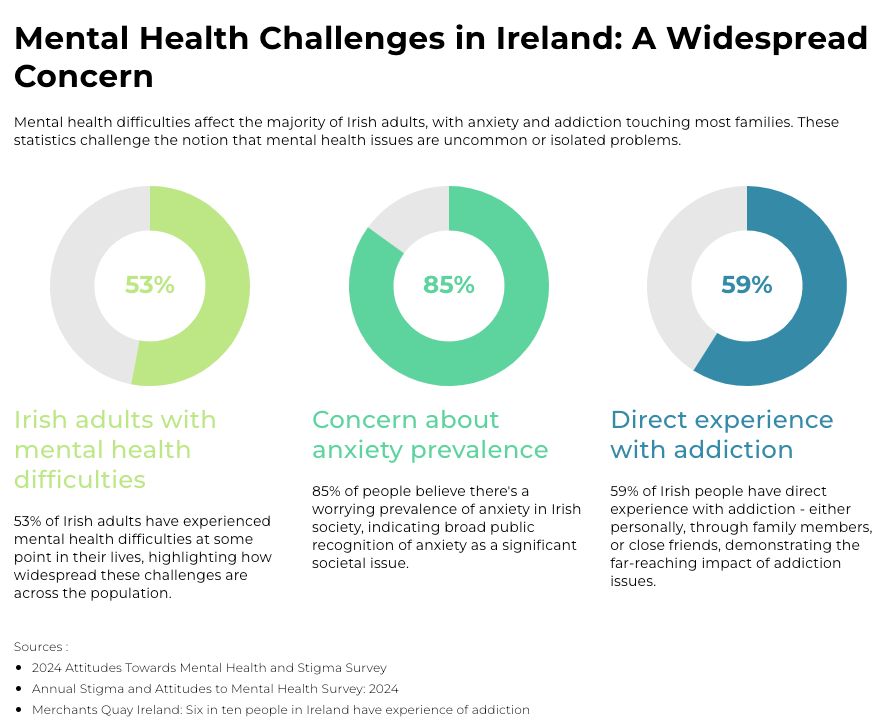
But here’s the kicker – despite all this, 34% of people who experienced mental health difficulties didn’t seek treatment. The main reason? Shame.
1 in 5 people would tell NO ONE if they were experiencing suicidal thoughts. 15% would tell no one about a substance issue.
Nearly a quarter (23%) of people consider seeking help for mental health a sign of weakness. Even worse, 68% believe that being treated for a mental health difficulty is seen as personal failure by society.
Think about that for a second. We have all these people suffering, but they literally cannot bring themselves to say it out loud. That’s exactly the gap Pleaze is designed to fill.
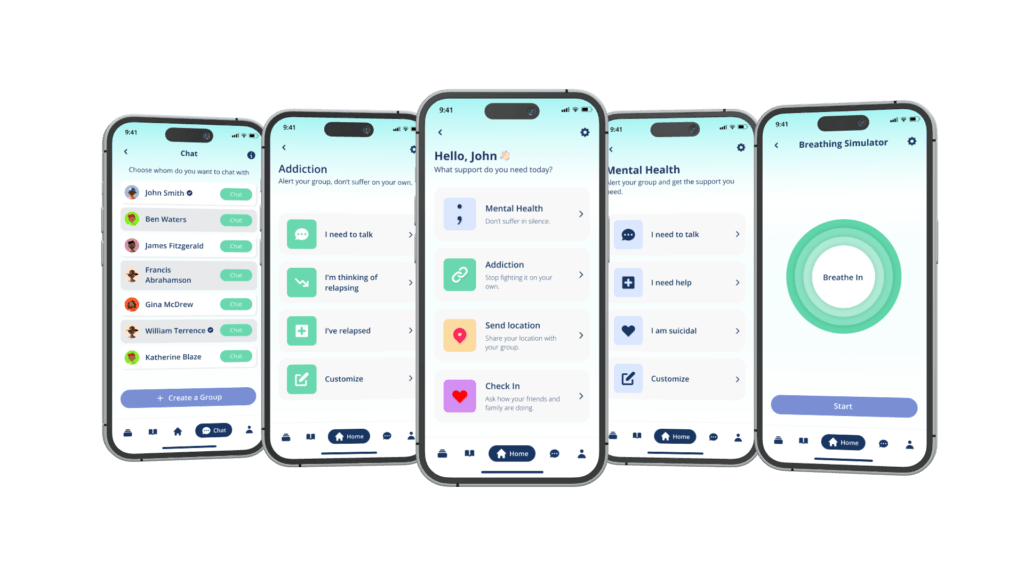
If people do manage to overcome the stigma and reach out for help, what do they find? A system that’s completely overwhelmed.
For kids needing mental health support? 3,681 children were waiting for a CAMHS appointment in August 2024. Get this – 1,011 had been waiting over three months, 298 for over nine months, and 173 children had been waiting over 18 months. Eighteen months. For a child in crisis.
One parent I read about said their son had been on a waiting list since he was three – he’s now nine. “The opportunity for early intervention has passed us by,” they said. That broke my heart.
Some families reported waits of up to six years for a diagnosis. Six years.
Here’s something most people don’t realize – when someone struggles with mental health or addiction, it doesn’t just affect them. The family becomes what researchers call “hidden patients.”
In Ireland, nearly 14,000 referrals were recorded over 11 years for affected family members seeking treatment themselves. Eight in ten were women, six in ten were living with children. So we’ve got mothers and grandmothers carrying this load, often while trying to hold families together.
And the family environment? One study found 48% of adolescent addiction service users reported substance misuse within their families. Another found 76% of family support program participants reported high levels of drug use by their children. These families are dealing with multiple layers of trauma.
This validates something fundamental about Pleaze – we’re not just building for the person in crisis. We’re building for their entire support network.
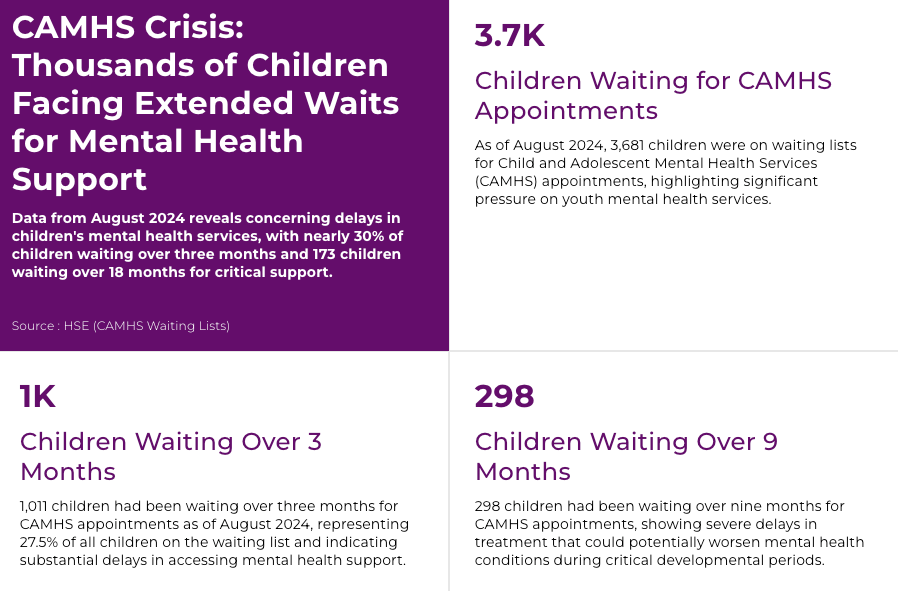
Mental health issues cost the Irish economy billions annually. Back in 2006, it was already over €3 billion – that was 2% of the entire Gross National Product. A 2024 estimate suggests poor mental health costs employers up to €2,000 per employee annually through absenteeism and burnout.
The 2022 report from Northern Ireland found it costs at least £3.4 billion per year there alone. And here’s the thing – 72% of that cost comes from lost productivity and the economic impact on informal carers.
For young people specifically? Direct costs to the Irish government are over €308 million per year. But the long-term cost when you factor in Disability Adjusted Life Years? €3.042 billion for a single youth cohort.
Think about it. The biggest financial hit isn’t from doctors and hospitals. It’s from people being unable to work and families having to step back from their careers to provide support.
This is where Pleaze makes economic sense. A free app that helps prevent crisis escalation and keeps people connected to their support networks? That directly addresses the most expensive part of the problem.
Here’s what really surprised me in my research – the Irish government isn’t just aware of these problems, they’ve made digital health a national priority.
They launched ‘Digital for Care: A Digital Health Framework for Ireland (2024-2030)’ specifically to address capacity constraints, waiting lists, and mental health challenges using digital technology.
Their mental health policy ‘Sharing the Vision (2020-2030)’ has 100 recommendations, including explicitly developing “digital health solutions to enhance service delivery and empower service users.”
Budget 2025 allocated nearly €1.5 billion for mental health services – a 44% increase since 2020. They’ve earmarked €190 million specifically for digital and ICT infrastructure, with €2.2 million dedicated to expanding digital mental health supports.
The thing about Pleaze is, It’s not based on some theory or trend. It’s based on what actually works for recovery.
Social support is consistently identified as one of the most important factors in recovery from alcohol and drug use. Studies show that people with greater social support have better treatment outcomes, longer periods of abstinence, and lower relapse rates.
One study found that family members in the social network were effective in prolonging abstinence one year after detoxification. There’s a direct positive relationship between the duration of drug abstinence and the amount of social support received.
Family involvement is linked to a lower likelihood of hospitalization or relapse and a higher likelihood of sticking to treatment plans. The American Society of Addiction Medicine confirms this – social support improves happiness, self-confidence, and a sense of belonging, all crucial during recovery.
But – and this is crucial – the support network needs to know what they’re doing. They need education and confidence to help effectively rather than accidentally enabling or making things worse.
That’s why Pleaze isn’t just an alert system. The courses and badges aren’t just feel-good features – they’re based on research showing that educated, empowered support networks are more effective.
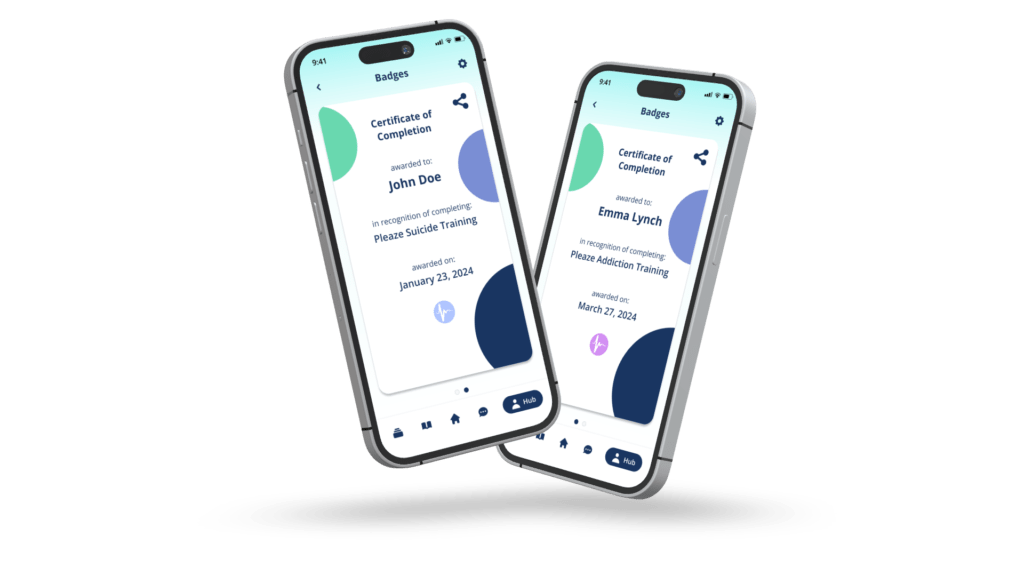
Let me be clear about something – Calm and Headspace are doing well in their lane. They’ve built massive libraries of meditation content and sleep stories. Talkspace and BetterHelp connect people with therapists.
But here’s what they’re not doing: they’re not activating the most powerful resource a person already has – their existing relationships.
There are over 10,000 mental health apps out there, but most fall into two categories: mindfulness/meditation (like Calm and Headspace) or teletherapy platforms. Here’s a crazy stat – 89% of high-traction mental health apps aren’t clinically validated. They’re avoiding the complex regulatory pathway by marketing as “wellness” rather than medical devices.
Pleaze sidesteps this whole mess. We’re not trying to be a medical device or provide therapy. We’re a communication tool that connects people to their existing support networks.
Look, I could throw more statistics at you, but here’s the real reason I believe in this: I’ve been there. I’ve been the person who couldn’t say they needed help. I’ve been the friend watching someone struggle and not knowing what to do.
The current system – where we expect people in crisis to navigate stigma, overcome shame, and then wait months for help – it’s not working. We’re losing people while they’re on waiting lists. We’re watching families tear themselves apart trying to provide support they’re not equipped to give.
Pleaze doesn’t replace therapy or meditation apps or professional treatment. But it fills a critical gap that exists between suffering in silence and getting formal help. It makes the ask for help easier and makes the response more effective.
Every piece of data I’ve looked at points to the same conclusion: there’s a massive demand for digital mental health solutions, Ireland has an acute need for better access to support, the government is actively investing in digital health infrastructure, and the most effective element of recovery – social support – is the most overlooked in the current market.
Pleaze isn’t just another app. It’s a response to a real problem, backed by research, launching into a supportive policy environment, addressing an underserved market need.
If we can help even one person reach out instead of suffering in silence, if we can help one family feel more equipped to support someone they love, if we can prevent even one tragedy by making it easier to ask for help – then all of this research, all these numbers, all this effort is worth it.
That’s what we’re building. That’s why it matters. And that’s why the timing is right.

Founder
Tags :
Blog, News The Global Mental Health Gap: How AI Could Bridge the...
Blog 9 Hard Truths About Mental Health Crisis (That I Wish Someone...
Blog From Psychiatric Hospital to App Store: The Real Story Behind Pleaze...
info@pleazeapp.com
+353 87 445 6877